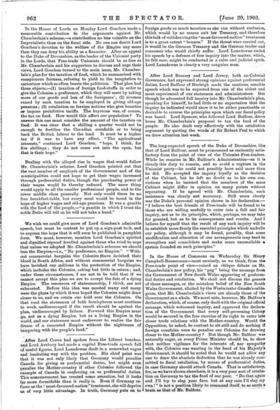In the House of Lords on Monday Lord Goschen made
a memorable contribution ft, the arguments against Mr. Chamberlain's scheme,—a contribution no less valuable on the Imperialistic than on the fiscal side. No one can doubt Lord Goschen's devotion to the welfare of the Empire any more than they can deny his ability as a financier. After an appeal to the Duke of Devonshire, as the leader of the Unionist party in the Lords, that Free-trade Unionists should be as free as• Mr. Chamberlain and his supporters to discuss and urge their views, Lord Goschen turned to the main issue, Mr. Chamber- lain's plan for the taxation of food, which he summarised with conspicuous fairness, refusing to yield to the temptation to caricature which so often besets the politician. That plan had three objects,—(1) taxation of foreign food-stuffs in order to give the Colonies a preference, which they will meet by taking more of our goods and less of the foreigners' ; (2) revenue raised by such taxation to be employed in giving old-age pensions ; (3) retaliation on foreign nations who give bounties or impose prohibitive tariffs. The keystone was, of course, the tax on food. How would this affect our population ? To answer this one must consider the amount of the taxation on food. It was clear that a shilling a quarter would not be enough to fertilise the Caradian cornfields or to bring back the British labour to the land. It must be a higher tax if it was to have any effect. "The agricultural interests," continued Lord Goschen, "hope, I think, for five shillings ; they do not come out into the open, but that is their hope."










































 Previous page
Previous page